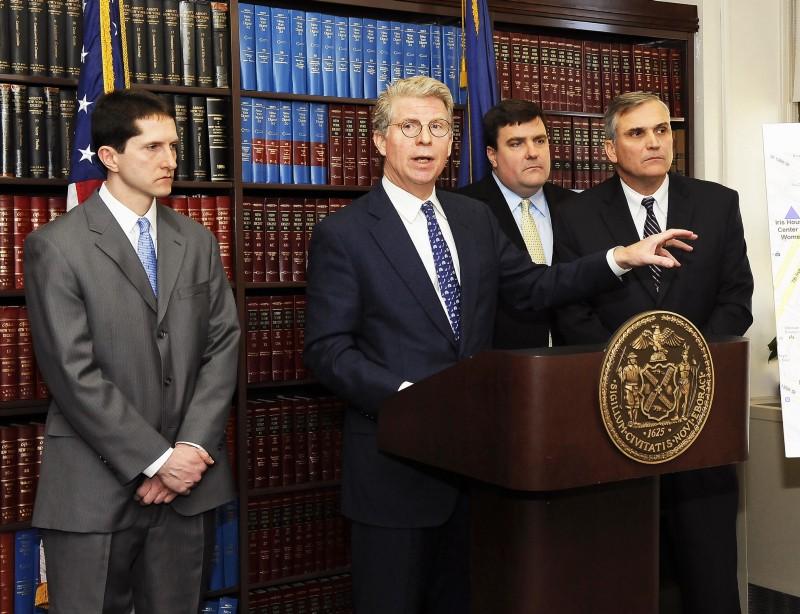Commentary: Cy Vance was Re-Elected. Here are Some Ways You Can Hold him Accountable.
Manhattan District Attorney Cy Vance was re-elected last week, an unsurprising twist given that his was the only name on the ballot. In fact, given the lack of official options, Vance’s victory was not so impressive. He still managed to garner only 90% of the vote — almost 20,000 people decided to write-in a candidate rather than […]

Manhattan District Attorney Cy Vance was re-elected last week, an unsurprising twist given that his was the only name on the ballot. In fact, given the lack of official options, Vance’s victory was not so impressive. He still managed to garner only 90% of the vote — almost 20,000 people decided to write-in a candidate rather than vote for him. (Many of the write-ins were for last-minute progressive candidate Marc Fleidner.)
Vance has been roundly criticized lately for not prosecuting Ivanka Trump and Donald Trump, Jr., for fraud in 2012. He’s also been criticized for not prosecuting Harvey Weinstein for sexual assault when given the opportunity. But, as I wrote recently in the New York Times, the real problem with Cy Vance is not what he fails to prosecute, but what he does.
Now that he’s officially in office another four years, voters, organizers, and grassroots groups have the opportunity to hold Vance’s feet to the fire. He has quite a well-resourced office, and in 2015 received $808 million from forfeited assets of international banks he prosecuted, giving him the potential to do some major things. Here are just three of the reforms he could focus on.
Reduce Rikers’ Manhattan Population
Manhattan is ranked first in Rikers’ admissions compared to other boroughs, but only third in population. Although Manhattan has approximately 1.6 million residents compared to Brooklyn’s 2.6 million, Brooklyn manages to send 23% less people to Rikers. Most of Manhattan’s disproportionate admissions are because Vance’s office sends significantly more people to jail for non-violent felonies and misdemeanors. About 80% of the defendants incarcerated at Rikers, which has been referred to as “torture island,” have not been convicted of a crime at all.
Vance’s total admits have decreased since last year, which is an improvement. But more can be done, and he should make it his goal to rely less on arrests and imprisonment and more on alternative solutions to incarceration.
Reform the Gravity Knife Law
Vance has been a staunch advocate for maintaining the gravity knife law. The statute, which is outdated and poorly worded, has often been used to arrest people, including carpenters and artisans, for common folding knives that can be purchased at a local store.
Many agree the law should be reformed. Cy Vance is not one of them.
His office has been particularly aggressive in prosecuting this “crime.” According to the Legal Aid Society, during a six-month period in 2015, his office prosecuted four-and-a-half times as many of its clients for gravity knives as did all the other boroughs District Attorneys combined. Of those prosecutions, only four defendants were accused of using the knife unlawfully; the rest were charged with simple possession.
A reform bill was introduced and passed the Assembly and Senate last year before being vetoed. Vance lobbied the state legislature against reform, and has “gone so far as to hold a confidential conference call with senate Republicans to argue against gravity knife reform.”
Many organizing groups have already pushed Vance to end these prosecutions, but the issue hasn’t garnered as much attention as it should. Ordinary citizens should demand that Vance stop prosecuting residents under this antiquated provision.
Address Racial Disparities
In 2014, the Vera Institute of Justice found that there are significant racial disparities in outcomes between white defendants and defendants of color in Vance’s office. Vance promised to try to address those disparities, but has not released significant follow-up data, so it’s impossible to know whether those disparities have improved significantly or not. But the data we do have doesn’t look good — for example, last year, 51 percent of marijuana cases involving black defendants in Manhattan ended in conviction, while only 23 percent involving whites did. (This September, Vance agreed to make some changes to how his office prosecutes marijuana possession.)
Vance has repeatedly lamented racial disparity in the criminal justice system. But his laments are not enough. It’s hard to know the extent of racial disparity in Vance’s office, and the public is entitled to robust and detailed data regarding prosecutions and convictions. But a solution must go beyond data. As more racial disparity comes to light, Vance should be held accountable for rectifying those injustices.
These are just some of the issues that Vance should turn his attention to as he starts his third term as District Attorney. But without outside pressure, he’s unlikely to reform these practices willingly. That’s why ordinary residents should continue to demand action on these issues.
Cy Vance is the head prosecutor in one of the most progressive cities in the country. It is time he acts like it.
